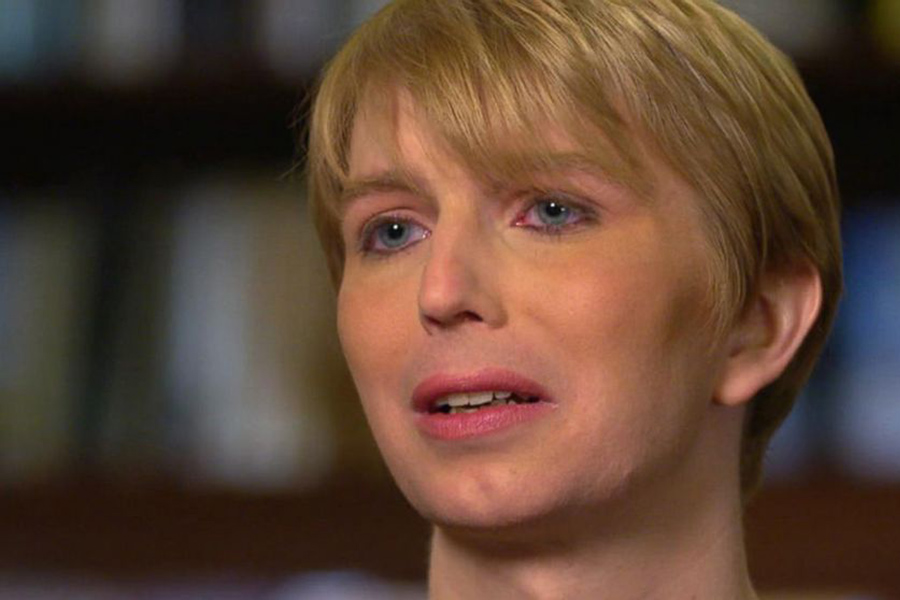Chelsea Manning fits in on a college campus.
Youthful and smiling, with Taylor Swift-blonde hair and black combat boots, she looks like any other University of Pennsylvania student. But Manning was invited to speak to the Penn community as one of the most divisive and influential figures in recent history.
Several Penn groups, including the political-science department and the LGBT Center, organized “A Conversation with Chelsea Manning” Nov. 29, which drew hundreds of Penn students, staff and faculty to the Annenberg Center.
The trans woman spoke with cultural anthropologist Briella Coleman, author of “Hacker, Hoaxer, Whistleblower, Spy,” about national security, social media and the intersection of identities and activism. Manning also opened up about her difficult time in prison and the current groundswell of political resistance.
Manning was originally sentenced to 35 years in military prison for releasing more than 750,000 sensitive military logs she accessed in her position as an Army intelligence analyst. Her sentence was commuted to time served by then-President Barack Obama early this year.
One of the most damning pieces of information was a video WikiLeaks titled “Collateral Murder,” which revealed the deaths of Reuters reporters Saeed Chmagh and Namir Noor-Eldeen by American military forces. Coleman described that release as “a watershed moment for hackers and hacker culture.”
Manning and Coleman did not address the current president or the country’s ongoing post-election identity crisis; instead, Manning took the larger “institutions of power” to task.
“Just look at the advertisers on CNN,” Manning said. “You see Boeing, Northrop Grumman — all of these companies that are churning out weapons and technology. It’s all about the bottom line and no one, including the mainstream media, has any incentive to give the unvarnished truth.”
She also talked more about how technological advancement puts civilians at risk.
“Leaders don’t understand the systems that are being developed underneath them. They often will deliberately misunderstand in order to justify an act. They’ll pick and choose outputs from an algorithm to justify a decision they’ve already made.
“I don’t think the people in tech are really thinking about the consequences of the tools they are creating,” Manning added. “The same data collection we use for marketing, we use to kill people.”
On Twitter, Manning uses the hashtag/mantra #WeGotThis, which she said sums up her belief in community and solidarity. She spoke in more detail about her role as an LGBT activist, the perception of her status as a “hacker” and her work as an advocate for civil liberties.
“There’s a certain intersectionality because all of our communities are facing off against the same institutions of power. It’s the police state, or corporations or the military, but we’re all pushing back against them. We really need each other and we don’t need a leader to tell us what we need,” she said. “The trans community has different issues, from people who are undocumented or activists in the tech community, but we all suffer under the same powerful institutions.”
Coleman also asked Manning’s thoughts on Canadian professor Jordan Peterson, who refuses to use gender-neutral pronouns, claiming they limit his free speech.
“Well, it’s all about him, isn’t it? And his feelings,” Manning responded. “But really, it’s not a free-speech issue. It’s a respect issue. It’s a dignity issue.”
In the second half of the event, attendees were encouraged to ask Manning questions, which ranged from prison labor and how Manning spent her time while incarcerated to national security and WikiLeaks.
When asked her thoughts on WikiLeaks now, Manning responded, “I don’t get into that. I’m focused on me right now.”
One student, who identified himself as a veteran, said, “I think it speaks a lot to who we are as a society that a self-admitted and convicted traitor has a platform to speak. Do you have any regrets?”
Manning’s voice boomed across the auditorium: “No, I don’t have any regrets.”

